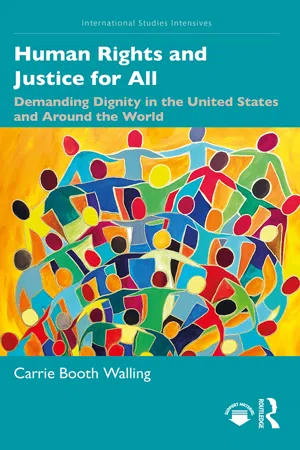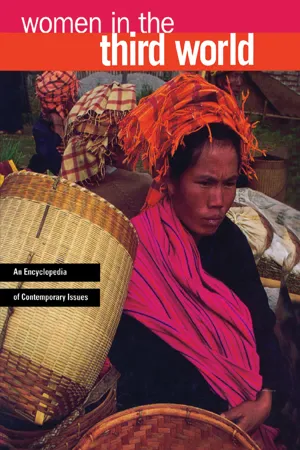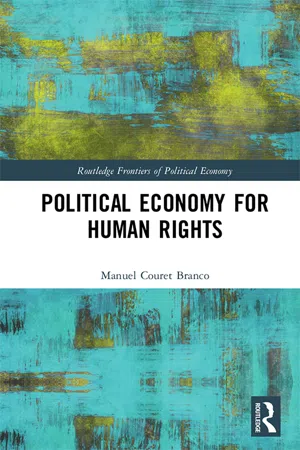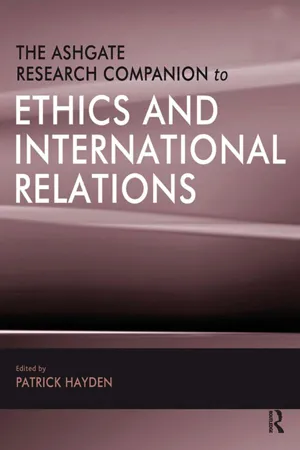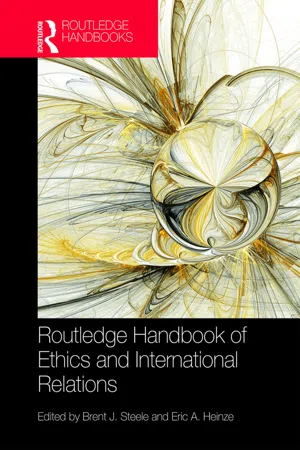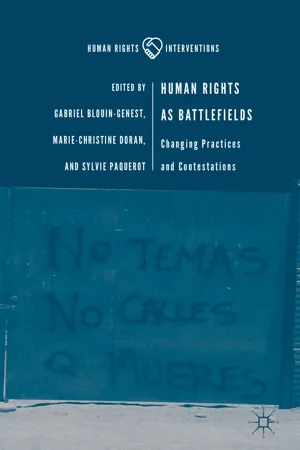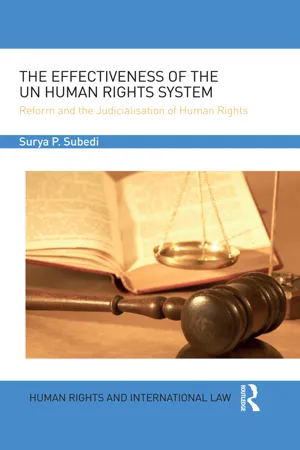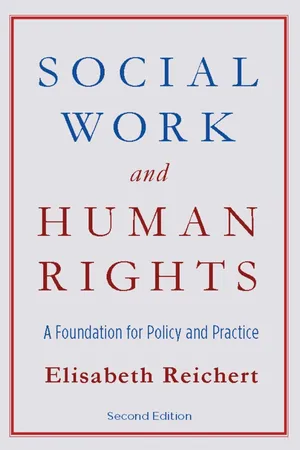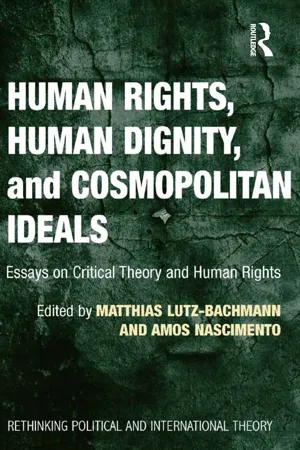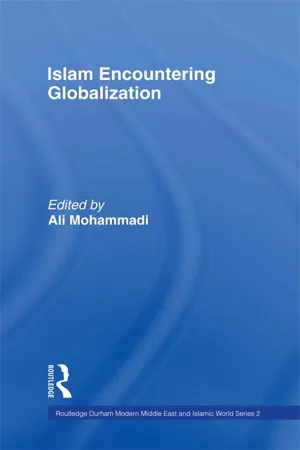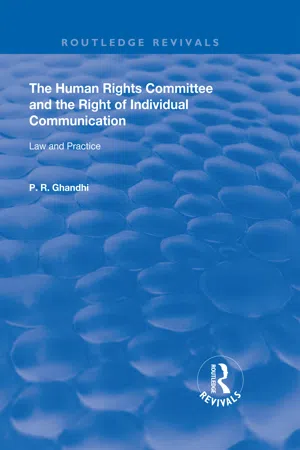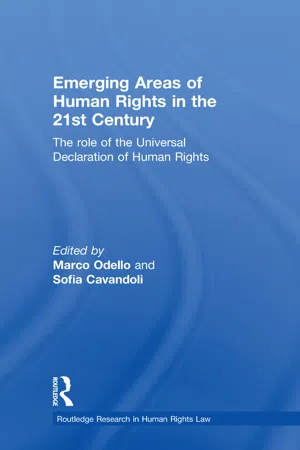Politics & International Relations
UN Human Rights
The UN Human Rights refers to the international framework established by the United Nations to protect and promote human rights globally. It encompasses various treaties, mechanisms, and bodies aimed at upholding fundamental rights and freedoms for all individuals, regardless of nationality, ethnicity, or other characteristics. The UN Human Rights system plays a crucial role in monitoring, reporting, and addressing human rights violations around the world.
Written by Perlego with AI-assistance
Related key terms
12 Key excerpts on "UN Human Rights"
- eBook - ePub
Human Rights and Justice for All
Demanding Dignity in the United States and Around the World
- Carrie Walling(Author)
- 2022(Publication Date)
- Routledge(Publisher)
Human rights are the rights every human being is born with. Human rights are about more than survival; they include those things that are essential to a life of dignity. These rights never go away even if those in power do not recognize them – they are inalienable. Human rights are universal. They are different than the rights granted by governments to their citizens. All human beings are born with human rights, do nothing to earn them, and their rights travel with them wherever they reside and no matter what border they cross. All human beings are equal in dignity and rights. Equality means that they apply to all persons regardless of gender, sex, race, religion, nationality, economic status, ability, sexual orientation, ethnicity, political belief, age, or any distinction of any kind. Importantly, all human rights are interdependent and interrelated. This means that human beings must have access to all their rights to achieve dignity. The violation of any single right limits the enjoyment of other rights. Human rights are an entitlement. They are not simply good or desirable. They are not a gift. People suffer harm when they are deprived of the human rights to which they are entitled. Although human rights are seldom fully realized, and often violated, that does not mean they do not exist. Rather, it is the deprivation of our human rights that mobilizes political action to claim them. In sum, human rights are the rights that every human is entitled to and are necessary for a life of dignity. Human rights are inalienable, equal, and interdependent.The content of our human rights are described in the Universal Declaration of Human Rights (UDHR) which passed without dissent in 1948 by the United Nations (UN) General Assembly, is legally codified in multiple international treaties, and was reaffirmed by UN members from all regions of the world through regional treaties and at the World Conference of Human Rights in 1993 and again in the UN 75 Declaration of 2020.1 Available in more than 500 languages and dialects, the UDHR is the most widely translated document in the world. The UDHR is composed of 30 articles which promote a shared vision of basic human rights and dignities that apply to all people in all nations (see Box 1.1). The preamble identifies respect for these human rights as, “the foundation of freedom, justice and peace in the world,” and disregard for human rights as barriers to their achievement. The 30 articles entail a variety of civil, political, economic, social, and cultural rights. These include the right to life (Article 3), peaceful assembly (Article 20), religion (Article 18), free and fair trial processes and humane treatment (Articles 5, 8–10), as well as reasonable work conditions, fair pay (Article 23), access to education (Article 26), and participation in cultural life and scientific advances (Article 27). By presenting these rights in a single document, the drafters signaled that these basic rights were interrelated and mutually reinforcing. For example, Article 6 says that everyone has the right to recognition as a person before the law – the right to a legal identity. The right to a legal identity is connected to every other human right in the UDHR and all the rights examined in this book. A legal identity is needed to access healthcare, education, to vote, to cross an international border, to open a bank account which is necessary for employment in the formal job sector, and to own property. Without access to a legal identity, people are uncounted and unprotected. Children without a legal identity are vulnerable to labor exploitation, human trafficking and enslavement, forced marriage, involuntary military service, and with no legal record of their existence there may be no record that they are missing. The World Bank estimates that more than 1 billion people worldwide lack a legal identity.2 - eBook - ePub
Women in the Third World
An Encyclopedia of Contemporary Issues
- Nelly P. Stromquist(Author)
- 2014(Publication Date)
- Routledge(Publisher)
The indivisibility and interdependence of human rights is another central tenet of the human-rights vision. It was first expressed in the Universal Declaration of Human Rights, which treats all the rights and freedoms guaranteed therein as equal. These include civil and political rights—such as the right to life, liberty, and security of person (Art. 3), to equal protection of the law (Art. 7), and to freedom of thought, conscience, and religion (Art. 18)—as well as economic, social, and cultural rights such as the right to work, to just and favorable conditions of work, and to protection against unemployment (Art. 22), the right to an adequate standard of living, including food, clothing, housing, and medical care (Art. 25), and the right to education (Art. 26).The indivisibility of human rights was reaffirmed in the declaration of the Second World Conference on Human Rights, which states that “the international community must treat human rights globally in a fair and equal manner, on the same footing, and with the same emphasis (Vienna Declaration, 1993, paragraph 5). Despite the rhetoric, in practice the international human-rights community has privileged civil and political rights, which are often regarded as the human rights. At the same time, it has neglected the promotion and protections of social, economic, and cultural rights, thereby ignoring some of women’s most pressing concerns.These developments were the result of political self-interests of the states and of Cold War politics. As Tomasevski (1993) recounts, soon after the adoption of the Universal Declaration in 1948, work began on translating its principles into a formally binding treaty. This turned out to be a long and conflict-ridden task. In the context of the Cold War, governments were not able to agree on a treaty. Positions of Communist and developing countries emphasized the protection of social and economic rights. Western and developed countries gave preference to the protection of civil and political rights, which, they argued, could be expressed in law, judged in court, and assessed by the United Nations Human Rights Commission (Ashworth, 1993 - eBook - ePub
- Manuel Couret Branco(Author)
- 2019(Publication Date)
- Routledge(Publisher)
1 Political economy and human rights Engaging the conversationIn order to achieve the Universal Declaration of Human Rights’ ideal of freedom, justice and peace in the world, individuals must be free from fear and want which, according to both the International Covenant on Civil and Political Rights (ICCPR) and the International Covenant on Economic, Social and Cultural Rights (ICESCR), can only be accomplished through the enjoyment of economic, social, cultural, civil and political rights. Human rights and economics are therefore unavoidably intertwined. Human rights established a set of legal and moral precepts that brought individuals security and justice and economics developed a considerable number of tools particularly intended to overcome, or at least mitigate, scarcity. Furthermore, access to many goods and services created in the productive sphere is needed to secure human rights. Although an increasingly important part of the world’s population benefits from this extended freedom, a substantial part is still deprived from its minimum enjoyment. In order to respond to the legitimate aspirations of these fellow citizens of the world, it is crucial that economics and human rights engage in meaningful conversation.The economic dimension of human rights
Human rights are a set of rights that human beings possess by the simple virtue of their humanity (Gibney 2016: 3), by having been brought to this world, and are registered in a variety of instruments of which the most relevant for this discussion are the Universal Declaration of Human Rights (UDHR), the ICESCR, the ICCPR and some of what have been called third generation rights, such as the Right to Development or the Right to the Environment. The scope of these rights range from the fulfilment of material aspirations, such as the right of everyone to an adequate standard of living for themselves and their family, to the enjoyment of immaterial amenities such as freedom of speech or of religion. - Patrick Hayden(Author)
- 2016(Publication Date)
- Routledge(Publisher)
This scrutiny would extend also to a third class of actor, namely the representatives of religious organizations. Traditional international relations scholarship has neglected the role of religious organizations in international affairs. The focus on state actors and their agency has led to a dearth of scholarship regarding the influence and role of religion. While many religions have institutional forms which enable them to direct agency into international affairs in ways easily recognizable by traditional international relations approaches (the Catholic Church with its leader, the Pope, being the consummate example), many religions do not have such easily assimilable institutional forms (see discussion in Dalacoura 2007). This makes the key role they do play in global politics, the influence they have over the advance of human rights, all the more critical.Taken together, these challenges to human rights universality show up the complexity of the situation. In a survey such as this one, it is not possible to plumb the depths of these issues (four excellent books that do so are Baxi 2006; Griffen 2008; Guilhot 2005; and Oberleitner 2007). But my intention here has been to illustrate two points. First, any discussion of the political or institutional universalization of human rights, while legitimately proceeding with some optimism, must nonetheless face the great obstacles which exist to the realization of its goals. Second, it must be realized that the project of universalizing the norms and ideals expressed within the doctrine of human rights is a deeply political project. Not all people identify with the normative goals of human rights universalization, and the attempt to implement those normative goals through institutional reform will generate opposition. This is as much the case when one looks at the challenges generated by implementing human rights at the international state system level, via regional cooperation, or within specific states, as it is when one goes beyond state structures to look at the behaviour of NGOs, TNCs and religious and other actors.Conclusion
The Universal Declaration of Human Rights speaks of human rights as ‘a common standard of achievement for all peoples and all nations …’. In this chapter we have considered some of the issues that surround the idea of there being such a common, universal standard. I have argued that the discourse of human rights emerges out of the political philosophy of liberalism and that its universalism stems from the normative assumptions within liberalism about the nature of the human person. I have also argued that for human rights to maintain its veracity as a cosmopolitan political project, it needs to adhere to these normative liberal values, pre-eminent among them the protection and well-being of the individual person. As with all political projects, the human rights project is and will continue to be controversial. In our world there are many points of view about what it means to be a human person, and not all of them are consonant with the values which are expressed in the international human rights regime. It is partly because of this that those who are involved in the promotion of human rights need to be clear about the normative commitments that are entailed by human rights, and need to have good reasons which they can present in defence of those commitments. These reasons will not satisfy everyone – and, indeed, reasoning is not all that is required: there is a desperate need for those who have declared their support for human rights to lead by example.- Brent J. Steele, Eric Heinze, Brent J. Steele, Eric Heinze(Authors)
- 2018(Publication Date)
- Routledge(Publisher)
22 Despite the troubling gaps that exist between human rights rhetoric and human rights abuses, a significant body of human rights law now occupies a prominent place in world politics. Human rights, however, are not only institutionalized legal standards. Such rights are properly called “human” rights because they furnish us with a critical vision of what it means to be human in society with others. Consequently, they are not simply a functional scheme for coherence of the international order but also possess their own normative content and potent trajectory.Aside from demonstrating the expansive role played by human rights at the international level, as well as indicating how claims for human rights have mushroomed since 1948, the most important issue in the contemporary rights framework is the search for a shared understanding of the normative foundation(s) for human rights. This project has been surrounded by controversy, however, as the standards professed in the UDHR were conceived first and foremost as a set of practical norms amenable to political consensus between diverse peoples from all over the world. International human rights are, as Charles Beitz points out, a “public doctrine” arising from a “collective political enterprise”.23 The collection of rights contained in the International Bill is not expressly associated with any specific religious faith, metaphysical theory, or philosophical worldview, so that the list of rights in principle can be associated with and interpreted from a variety of traditions and perspectives.24 Attempts to ground human rights theoretically—that is, to provide justifiable reasons for why there are human rights at all, and why they should be prized so highly—are thus characterized by philosophical heterogeneity and extrinsic tensions, but by considerable overlap as well. The vast and ongoing philosophical argument about the adequate grounds for human rights—ranging widely across “foundationalist” and “non-foundationalist” approaches—is beyond the scope of this chapter.25 Such debates are crucial nonetheless to providing the dynamic for the continuing development of how human rights are both conceived and practised, and demonstrate that there are, in fact, several possible bases to justify rights morally (which may also help prevent human rights from simply becoming a matter of dogma). While acknowledging the complexity of mediating among different justifications, this section will briefly set out a propositional grounding for human rights as provided by the French jurist René Cassin, one of the main drafters of the UDHR. Cassin compared the Declaration to the portico of a temple resting on four cornerstones corresponding to “dignity, liberty, equality, and brotherhood”.26- eBook - ePub
Human Rights as Battlefields
Changing Practices and Contestations
- Gabriel Blouin-Genest, Marie-Christine Doran, Sylvie Paquerot, Gabriel Blouin-Genest, Marie-Christine Doran, Sylvie Paquerot, Gabriel Blouin-Genest, Marie-Christine Doran, Sylvie Paquerot(Authors)
- 2018(Publication Date)
- Palgrave Macmillan(Publisher)
contentious politics .Human Rights: The Conflicting (Hi)Story of Political Landmarks
Human rights are sometimes understood as fixed objects, reproduced in international law documents, practices and organizations. They appear as conceptual objects created once and for all in the specific post WWII context. Human rights are rarely analyzed for their fluidity and malleability, and especially not in terms of how community groups and activists are key to the definitional and conceptual process of what human rights are outside of their setting in international law. The objective of this chapter is to start a re-problematization of the dominant understanding of human rights. This re-problematization is also a call for a re-politicization of human rights.Since the creation of the United Nations (UN ) in 1945, human rights went through several evolutions, contestations and paradigmatic shifts: “[t]he concept of rights is expanding rapidly, propelled by increased knowledge and experience, changing societal challenges and conditions, and realization of the inherent limits in the earlier rights concepts and practices.” (Mann 2006 , p. 1940). These changes are analyzed quite differently depending on the perspective adopted and/or the place from which they are analyzed. From being a necessary tool for the emancipation of different “oppressed” or “victimized” groups to being used as moralistic instruments for neocolonialism and liberalism , human rights have been characterized by conflicting positions and interpretations. Human rights have been an active “battlefield” for multiple—and various types of—actors (Blouin-Genest and Paquerot 2016 ; Doran 2016 - eBook - ePub
The Effectiveness of the UN Human Rights System
Reform and the Judicialisation of Human Rights
- Surya Subedi, OBE, QC (Hon)(Authors)
- 2017(Publication Date)
- Routledge(Publisher)
The architecture of the ICC itself is not satisfactory enough to deal with the challenges of the twenty-first century multi-polar world. Its jurisdiction is limited to only very serious cases of violations of human rights and humanitarian law amounting to crimes against humanity; individuals have no direct access to it and there is very little it can do about crimes against humanity in States which are not a party to the Rome Statute – and the number of such States is large. Of course, the Security Council of the UN has the power to refer matters relating to crimes against humanity committed in States not party to the Rome Statute, but the Council itself is often crippled by the veto power wielded by its permanent members.1.16 The impact on the UN Human Rights agenda by the rise of multi-polarism
Another challenge in the hands of the UN Human Rights machinery is posed by multi-polarism in international relations. Much of the international system in general, and the UN Human Rights system in particular, was conceived, designed and developed in the political context of the bi-polar political world of the Cold War in the twentieth century. The UN Human Rights system is very much the result of compromise between those countries placing a great deal of emphasis on an individual liberty-based theory of reserved natural rights of the individual, among others, and those Communist States adhering to the idea that sovereignty of the State is pre-eminent and there can be no international limitation on this sovereignty, or that international interference in any pretext in the internal affairs of the State cannot be accepted. The pre-eminence of the State was the idea that was advanced in the run up to the 1966 International Covenant on Civil and Political Rights (ICCPR) and International Covenant on Economic and Social Rights (ICESCR) and especially the ICCPR’s Option Protocol. The rights enunciated and especially the monitoring mechanisms pursuant to the 1966 Covenants were influenced by the ideological and political divisions of the world at the time. For instance, the Covenants omitted certain rights such as the right to property, heralded as a cardinal right of any individual in the free-market world. - eBook - ePub
Social Work and Human Rights
A Foundation for Policy and Practice
- Elisabeth Reichert(Author)
- 2011(Publication Date)
- Columbia University Press(Publisher)
The International Covenant on Civil and Political RightsIn 1976, a sufficient number of member countries of the United Nations had ratified (or approved) the International Covenants on Civil and Political Rights and Economic, Social, and Cultural Rights to put the covenants into force within the approving countries. A UN covenant takes effect only after a specified number of member countries of the United Nations have approved it. Countries approving the covenant are then legally bound to enforce its provisions. Only by signing and then formally approving a covenant does a country indicate its intent to be bound by it. Even then, unless a covenant states that it is “self-executing,” a country that has approved it must pass laws to enforce it. Neither the covenant on civil and political rights nor the covenant on economic, social, and cultural rights contains self-executing provisions. Although the United States has ratified the covenant on civil and political rights, the government has not enacted specific legislation to enforce it. Although many provisions in the covenant are similar to already existing laws in the United States, some of the provisions are new. Yet because the covenant is not self-executing, its provisions are not legally binding in the United States and thus makes reliance on the document a tenuous proposition. The remainder of this chapter addresses the provisions of the covenant on civil and political rights.Historically, the United States has paid much more attention to the human rights in the International Covenant on Civil and Political Rights than those in the International Covenant on Economic, Social and Cultural Rights. Indeed, this focus on political and civil rights has often led the United States to take a one-sided view of human rights, without adequately recognizing that human rights go beyond the political sphere. For U.S. social workers, this focus on political human rights may have led to a reluctance to study and integrate human rights into the social work profession. Yet, as will be evident in an analysis of the covenant, political and civil human rights also have a close connection to the profession’s interventions and principles.Introduction to the CovenantThe preamble or introduction to the International Covenant on Civil and Political Rights expressly lists civil and political rights that “derive from the inherent dignity of the human person” (see appendix B - Matthias Lutz-Bachmann, Amos Nascimento(Authors)
- 2016(Publication Date)
- Routledge(Publisher)
Given these developments, specific legal rules are required from the perspective of the three juridico-political principles of philosophy I established above, so that we may ensure that the claims of these political principles are operative and effective also in the worldwide realm of political action which has been affected by globalization. Thus, next to or above the current scope of national law and its structures such as legislation, enforcement and adjudication, fundamental structures of political order are necessary in order to replace the existing mechanisms of politics which are overly dominated by the national power interests and hegemonic policies of traditional states as well as by classic international treaty laws. Specific and concrete starting points for such a development could provide a politically oriented reform of the United Nations Charter, based on the principles of democratic legitimacy; also, the constitution of an International Criminal Court would be in line with the perspective of this reform. 28 Implications for Status of Human Rights This brings me to my final step, namely the question concerning the significance of the concepts presented thus far for the idea of human rights today. In view of the above mentioned developments in international politics, I consider that a big problem in contemporary discourses on the role of human rights consists in an observed inflation of a merely rhetorical use of human rights while their function in relation to political tasks remain largely undefined or even controversial. This condition is not only unsatisfactory but also dangerous because it brings about the risk of an exploitation or instrumentalization of human rights for arbitrary purposes and, thus, for their misuse- eBook - ePub
- Ali Mohammadi(Author)
- 2012(Publication Date)
- Routledge(Publisher)
Islam gave humanity an ideal code of human rights 1400 years ago. The purpose of these rights is to confer honour and dignity on humanity and to eliminate exploitation, oppression, and injustice. Human rights in Islam are deeply rooted in the conviction that God, and God alone, is the author of Law and the source of all human rights. Given this divine origin, no leader, no government, no assembly or any other authority can restrict, abrogate or violate in any manner the rights conferred by God.(Arkoun 1994: 106)1This Islamic code of human rights is conceptually very different to secular human rights declarations. In order to identify the differences between the two approaches, we will look briefly at the premise of the concept of human rights in the West.In the twentieth century serious discussion about human rights was initiated with the United Nations Declaration of Human Rights in 1948. This was followed by the Convention for the Protection of Human Rights and Fundamental Freedoms in 1950. In 1966, The International Covenant on Civil and Political Rights was approved by the United Nations Security Council. In these discussions, Western powers concentrated on discovering common denominators, rooted in the Judaeo-Christian traditions of human rights. Islamic traditions were not considered, even to the extent of ignoring Muslim representations from Islamic countries. Politically, it was quite obvious that the views of Islamic governments were not important in the establishment of a human rights commission during 1950s. The debate on human rights assumed that, despite the differences which characterize the diversity of cultures, political conduct can be conceptualized within certain common circumstances and values (Said and Mohammadi 1978).2Human rights in the West
The idea of human rights in Western civilization has its roots in the philosophical traditions of the Greek and Roman civilizations. In recent centuries, Western political traditions have accommodated various theories of political behaviour and reshaped them into certain rights. These rights have been endorsed in various treaties among the European nations.Prior to the First World War, there were efforts to promote individual rights at the national level. These efforts took as a reference point important historical documents, such as the French Declaration of the Rights of Man and the Citizens in 1789, and the Brussels 16 Nations Convention about the total cessation of the slave trade and the recognition of various rights for human beings in 1890 (Fareed 1977; Renteln 1990).3 - eBook - ePub
- P. R. Ghandhi(Author)
- 2019(Publication Date)
- Routledge(Publisher)
The International Covenant on Civil and Political Rights (1966)PREAMBLE
The States Parties to the Present Covenant,Considering that, in accordance with the principles proclaimed in the Charter of the United Nations, recognition of the inherent dignity and of the equal and inalienable rights of all members of the human family is the foundation of freedom, justice and peace in the world,Recognising that these rights derive from the inherent dignity of the human person,Recognising that, in accordance with the Universal Declaration of Human Rights, the ideal of free human beings enjoying civil and political freedom and freedom from fear and want can only be achieved if conditions are created whereby everyone may enjoy his civil and political rights, as well as his economic, social and cultural rights,Considering the obligation of States under the Charter of the United Nations to promote universal respect for, and observance of, human rights and freedoms,Realising that the individual, having duties to other individuals and to the community to which he belongs, is under a responsibility to strive for the promotion and observance of the rights recognised in the present Covenant, Agree upon the following articles:PART I
Article 1
- All peoples have the right of self-determination. By virtue of that right they freely determine their political status and freely pursue their economic, social and cultural development.
- All peoples may, for their own ends, freely dispose of their natural wealth and resources without prejudice to any obligations arising out of international economic co-operation, based upon the principle of mutual benefit, and international law. In no case may a people be deprived of its own means of subsistence.
- eBook - ePub
Emerging Areas of Human Rights in the 21st Century
The Role of the Universal Declaration of Human Rights
- Marco Odello, Sofia Cavandoli(Authors)
- 2012(Publication Date)
- Routledge(Publisher)
The nature of a state’s government along with its commitment to democracy and human rights was not a factor for determining who participated in the new international organisation and future membership to the UN required a state to be ‘peace-loving’ with no definition of what this actually meant. 34 At the same time the impact of events during the Second World War did ensure that the protection of human rights featured as an item in the agenda of the new organisation. 35 The final version of the Charter included references to ensuring faith in human rights, contributing to social progress and improving standards of life for all. It further provided that the UN and the Member States would take action for the promotion and protection of human rights. 36 The Economic and Social Council was given the responsibility for setting up a Commission to address the protection of human rights, 37 which occurred in 1946 and the first objective for this newly constituted Commission was to draw up an International Bill of Rights, of which the UDHR would be the cornerstone of this process. A full account of the drafting process of the UDHR is documented elsewhere 38 and due to space restraints it is only possible to highlight some of the key issues raised regarding the nature and form of governance. The term democracy appears only once in the UDHR in reference to a ‘democratic society’ in Article 29, however the issue of how governance should be constituted was a prominent theme during the drafting process. This process was clearly influenced by varying philosophical views and even more critically by the emerging ideological divide that would come to characterise the Cold War
Index pages curate the most relevant extracts from our library of academic textbooks. They’ve been created using an in-house natural language model (NLM), each adding context and meaning to key research topics.
